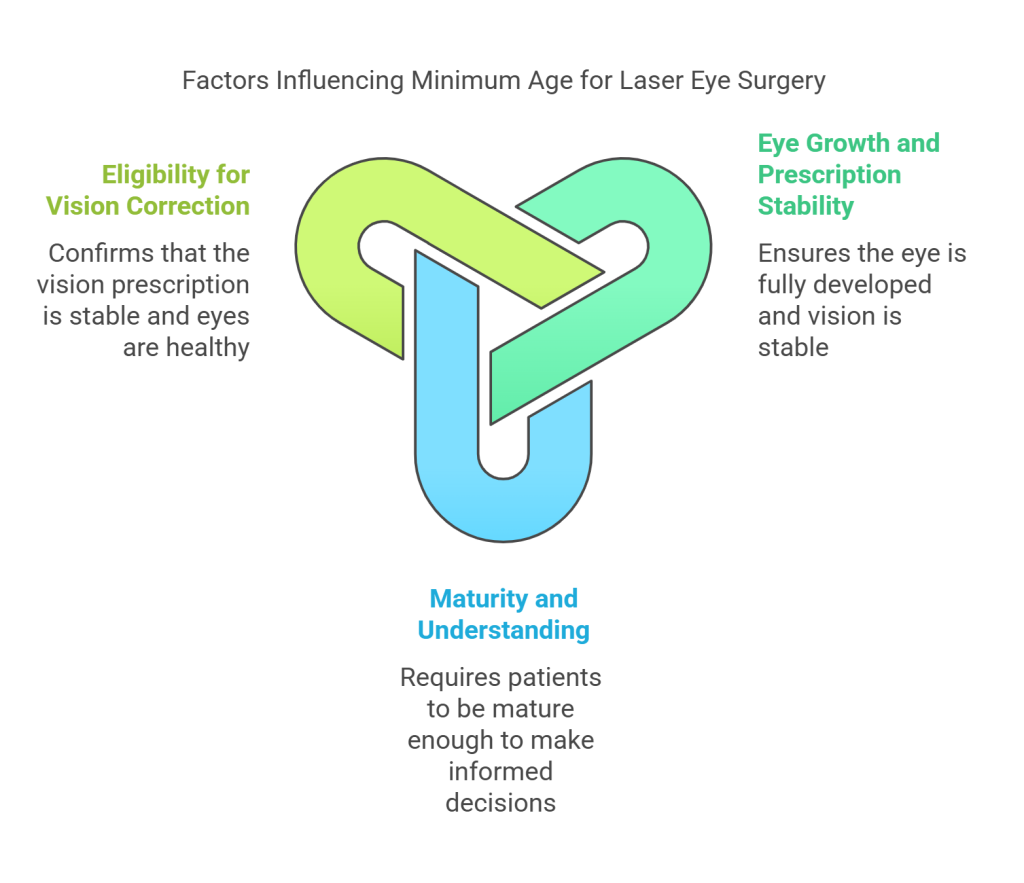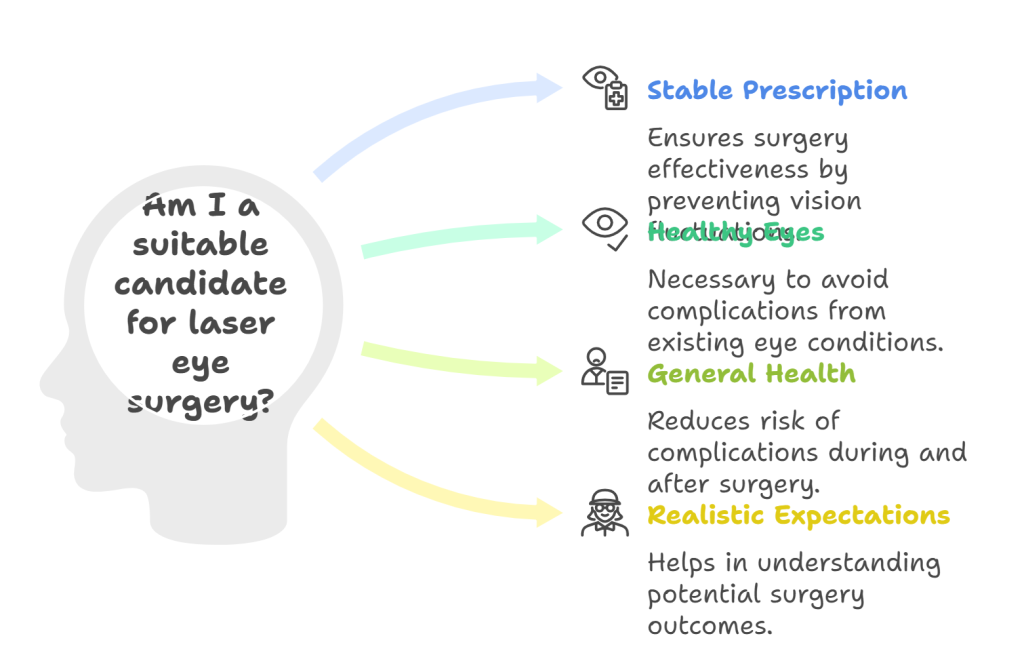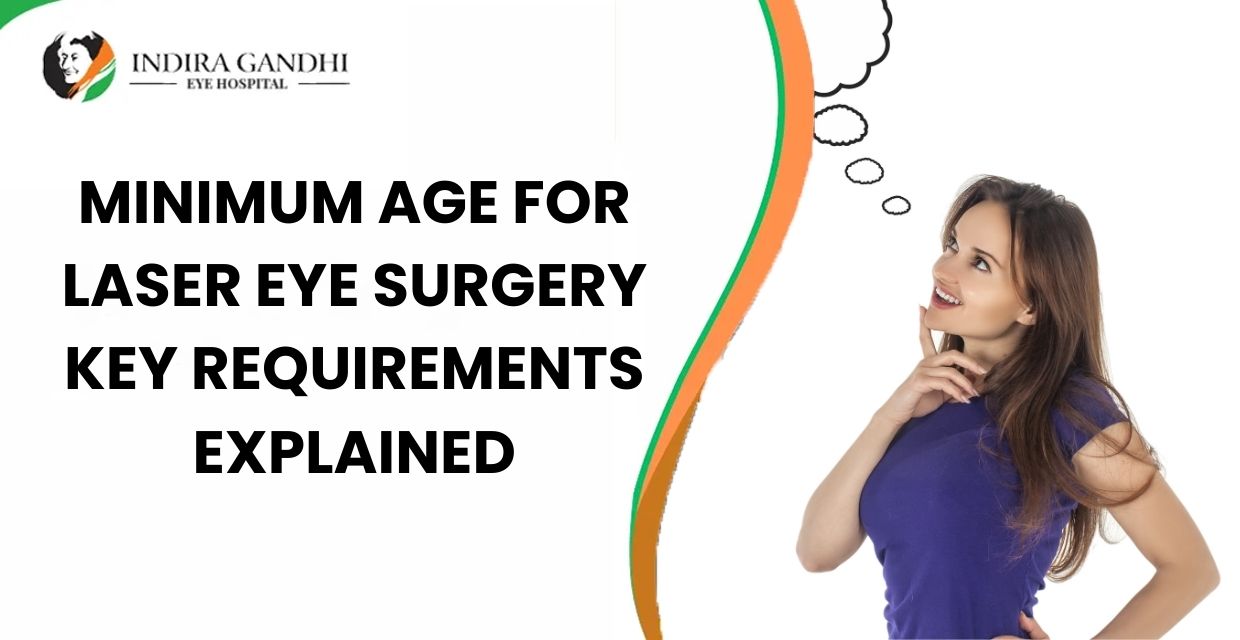|
Getting your Trinity Audio player ready...
|
Laser eye surgery has become one of the most popular and effective ways to correct vision problems like nearsightedness, farsightedness, and astigmatism. It offers a long-lasting solution for many people who are tired of wearing glasses or contacts. However, just like any medical procedure, some specific requirements and conditions must be met before you can undergo laser eye surgery. One of the most important factors to consider is the minimum age for laser eye surgery.
In this blog, we will explain the key age requirements for laser eye surgery, the reasons behind these age guidelines, and other important factors you should consider before deciding whether to undergo the procedure. By the end, you’ll have a clearer understanding of what you need to know before deciding to correct your vision with laser surgery.
What Is Laser Eye Surgery?
Laser eye surgery refers to a variety of procedures that use laser technology to reshape the cornea, the clear front surface of the eye. This reshaping improves the way light enters the eye, allowing it to focus more accurately on the retina. The most common laser eye surgeries are:
- LASIK (Laser-Assisted in Situ Keratomileusis): The most well-known laser eye surgery, LASIK uses a laser to create a flap in the cornea, which is then reshaped to correct vision problems.
- PRK (Photorefractive Keratectomy): Similar to LASIK, but instead of creating a flap, the outer layer of the cornea is removed, and the laser reshapes the cornea beneath it.
- SMILE (Small Incision Lenticule Extraction): A newer procedure that involves making a small incision to remove a lenticule of tissue from the cornea to reshape it.
- LASEK (Laser-Assisted Subepithelial Keratectomy): A variant of PRK that involves lifting the epithelial layer of the cornea before reshaping it with a laser.
These procedures are designed to correct refractive errors such as myopia (nearsightedness), hyperopia (farsightedness), and astigmatism, reducing or eliminating the need for glasses or contact lenses.
What Is the Minimum Age for Laser Eye Surgery?

The minimum age for laser eye surgery is typically 18 years old. However, this age requirement can vary slightly depending on the country, clinic, and specific procedure.
Why Is 18 the Minimum Age for Laser Eye Surgery?
There are several important reasons why the minimum age for laser eye surgery is set at 18:
- Eye Growth and Prescription Stability: The human eye continues to grow and change throughout childhood and adolescence. By the age of 18, the eye typically reaches its full size, and the vision prescription becomes stable. If you have laser eye surgery before your prescription stabilizes, there is a risk that your vision will continue to change, and you may require additional treatments or even end up with an incorrect prescription.
- Maturity and Understanding: Laser eye surgery is a significant decision that requires maturity. The procedure involves careful consideration, and patients must be able to understand the risks, benefits, and recovery process. At 18, individuals are legally considered adults and are typically able to make informed decisions about their healthcare.
- Eligibility for Vision Correction: While some people may develop stable vision at an earlier age, most eye surgeons recommend waiting until the age of 18 to ensure that the vision prescription has fully stabilized. It’s also important that the patient has healthy eyes, free from conditions like cataracts or other diseases that could affect the surgery’s outcome.
Can Younger People Have Laser Eye Surgery?
In certain cases, younger individuals may be eligible for laser eye surgery if their prescription has stabilized and their eyes have reached maturity. However, this is rare, and it’s generally advised to wait until at least 18 years of age. Some clinics may offer consultations for individuals younger than 18, but most surgeons will recommend waiting for the eyes to stabilize before proceeding with the surgery.
If you’re under 18 and struggling with your vision, contact lenses or glasses may still be the best option until your prescription stabilizes.
Other Key Requirements for Laser Eye Surgery
While age is an important factor in determining whether you’re eligible for laser eye surgery, there are several other key requirements to consider. These factors help ensure the success and safety of the procedure.

1. Stable Prescription
For laser eye surgery to be effective, your prescription must be stable for at least one year. This means that your vision should not change significantly within that time period. If your prescription is still fluctuating, the surgery may not be effective, and your vision could continue to deteriorate after the procedure.
2. Healthy Eyes
Laser eye surgery is designed to treat refractive errors in healthy eyes. Certain eye conditions, such as cataracts, glaucoma, or corneal diseases, may disqualify you from being a candidate for the surgery. Additionally, if you have eye infections or dry eyes, your surgeon may recommend treating these conditions first before undergoing the procedure.
3. General Health
You should be in good general health before undergoing any surgery, including laser eye surgery. Conditions like autoimmune diseases, diabetes, and pregnancy can affect the healing process or increase the risk of complications. It’s important to discuss any medical conditions with your surgeon during your consultation to determine if you are a suitable candidate.
4. Realistic Expectations
It’s essential to have realistic expectations about the results of laser eye surgery. While many people experience significant improvements in their vision, not everyone achieves perfect 20/20 vision. Some individuals may still need glasses or contacts for certain activities, such as reading or driving at night. A thorough consultation with your eye surgeon will help you understand the potential outcomes and whether laser eye surgery is the right choice for you.
5. No Pregnancy or Breastfeeding
Women who are pregnant or breastfeeding are generally not considered ideal candidates for laser eye surgery. Hormonal changes during pregnancy and breastfeeding can cause fluctuations in vision, which can affect the surgery’s results. It’s best to wait until after pregnancy and breastfeeding before considering the procedure.
Black Fungal Disease and Its Impact on Laser Eye Surgery
One important consideration for individuals planning to undergo any form of eye surgery, including laser eye surgery, is the potential risk of infections, such as black fungal disease or mucormycosis.
What Is Black Fungal Disease?
Black fungal disease, also known as mucormycosis, is a rare but serious fungal infection that can affect people with weakened immune systems, such as those recovering from COVID-19, individuals with diabetes, or those undergoing immunosuppressive treatments. This infection can affect various parts of the body, including the sinuses, lungs, and eyes. If left untreated, mucormycosis can cause severe complications, including blindness, organ failure, and even death.
How Does Black Fungal Disease Affect the Eyes?
In some cases, black fungal disease can cause damage to the eyes, leading to vision loss. The fungus can invade the tissues around the eyes, leading to symptoms such as swelling, redness, blurred vision, and in severe cases, necrosis (death) of the eye tissue. If you’re undergoing laser eye surgery, it’s essential to discuss any recent infections or health conditions with your surgeon to ensure that your eyes are healthy and ready for the procedure.
Preventing Black Fungal Disease
To prevent infections like mucormycosis, it’s essential to take steps to maintain good overall health, especially if you have diabetes or are recovering from an illness like COVID-19. Following your doctor’s advice, managing underlying health conditions, and maintaining good hygiene can help reduce the risk of fungal infections.
Consult with expert doctors.
FAQs about Laser Eye Surgery
What is the minimum age for laser eye surgery?
The minimum age for laser eye surgery is typically 18 years old. This ensures that the eyes have fully developed and that the prescription has stabilized.
Can I undergo laser eye surgery if I’m under 18?
In some cases, if your vision prescription is stable and your eyes have matured, you may be eligible for surgery before the age of 18. However, most surgeons recommend waiting until at least 18 years old.
What are the requirements for laser eye surgery?
Key requirements include having a stable prescription, healthy eyes, being in good general health, and having realistic expectations about the results.
Can I have laser eye surgery if I have a health condition?
Certain health conditions, such as autoimmune diseases, diabetes, or pregnancy, may affect your eligibility for laser eye surgery. It’s important to discuss your medical history with your surgeon during the consultation.
How long does recovery take after laser eye surgery?
Recovery time varies depending on the type of procedure, but most patients experience noticeable improvements in their vision within a few days to weeks. LASIK typically has a shorter recovery time than PRK or other procedures.
Is laser eye surgery safe?
Laser eye surgery is generally considered safe, with a high success rate. However, like any surgery, there are risks involved, so it’s essential to choose an experienced surgeon and follow all aftercare instructions.
Conclusion
Laser eye surgery offers a life-changing opportunity for those who want to reduce or eliminate their dependence on glasses and contact lenses. Understanding the minimum age for laser eye surgery, along with the other key requirements, is crucial for making an informed decision. If you meet the eligibility criteria and have realistic expectations, laser eye surgery could be the solution you’ve been looking for to achieve clear, glasses-free vision.
If you’re considering laser eye surgery, schedule a consultation with a qualified ophthalmologist at Indira Gandhi Eye Hospital today. Our team of experts will guide you through the process and help you determine if laser eye surgery is the right choice for you.












